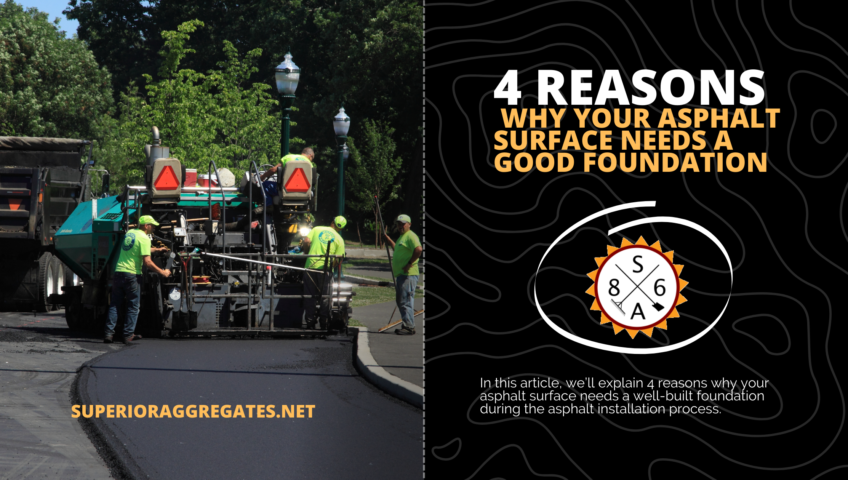
4 Reasons Why Your Asphalt Surface Needs a Good Foundation
As the saying goes: you can’t build a great building on a weak foundation. The same holds true for asphalt surfaces.
Asphalt surfaces also need strong, durable foundations so they don’t crack and break apart under pressure. Building an asphalt parking lot or driveway is a big investment, and it won’t last nearly as long without a solid foundation underneath it. A poor foundation means you could be paying for expensive repairs – or even complete replacement – prematurely.
A good asphalt foundation typically consists of the best materials and compact gravel available and should be strong enough that the gravel doesn’t break apart when you put your foot on it.
In this article, we’ll explain 4 reasons why your asphalt surface needs a well-built foundation during the asphalt installation process.
1. Your surface will have proper drainage
An asphalt surface’s foundation has a tremendous impact on drainage. Asphalt should be laid in a specific way to funnel water away.
During heavy rains, all of that water must go somewhere. An improperly designed and constructed foundation can lead to low spots or dips on the asphalt during the paving process, which can cause water to gather and puddles to form. Foundations that aren’t completely smooth can also create dips or sinks while being paved.
Many asphalt drainage problems, including slow draining, occur during the initial design stage. Asphalt parking lots, roads, and driveways need an appropriate level of elevation drop to remove water effectively.
2. Your surface will need fewer repairs
A properly built asphalt surface foundation can lead to fewer repairs throughout the surface’s lifetime. For example, if you notice “ponding” on the surface, it’s usually because the asphalt’s foundation has sunk in certain areas or become uneven due to the foundation losing some of its base integrity. This can happen over time.
A foundation that breaks down prematurely can be caused by rocks shifting and moving due to pressure, which can lead to warping and cracking. Early cracking is often caused by a poorly constructed foundation.
3. Your surface will be safer
When asphalt parking lots, driveways, and roads have strong foundations, they are significantly safer to drive and walk on. Cracks and dips that form when the gravel below the asphalt sinks can cause people to trip and fall.
The well-built foundation will also insulate the upper layers of the asphalt during the winter to stop ice from forming on the surface, preventing hazardous surface conditions in the process. If the foundation was poorly constructed and excess moisture is allowed to the surface, the constant freeze-thaw cycle can create new cracks and cause existing ones to expand.
4. Your surface will last longer
Asphalt pavement can last about 15 to 30 years on average, but its lifespan largely depends on how well the foundation was laid and whether regular maintenance was performed.
In fact, the condition of the foundation plays a large role when determining whether to resurface or replace an asphalt surface. If the foundation is still strong and intact after 20 years, you may want to consider resurfacing. Replacement is often recommended if the driveway is 20 to 30 years old and the foundation has completely failed.
Consider hiring only asphalt companies with good online reviews and a strong Better Business Bureau score.
